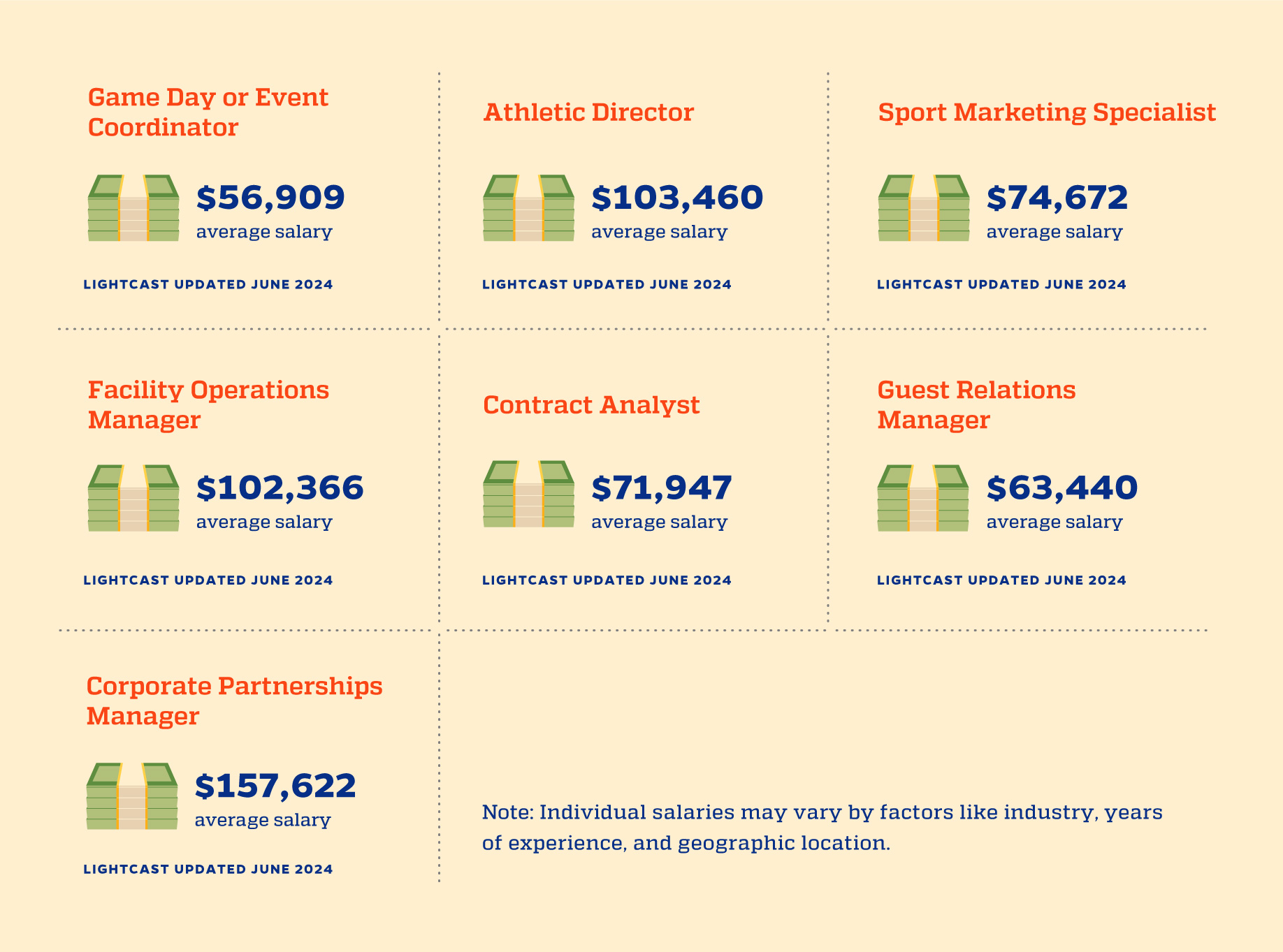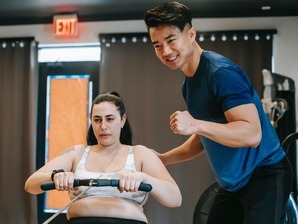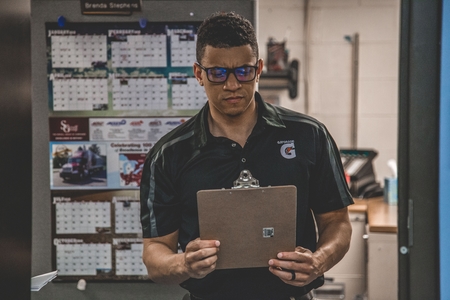What Can You Do With a Sports Management Degree?
Comments Off on What Can You Do With a Sports Management Degree? “The world is changing a lot,” says University of Florida Athletic Director Emeritus Jeremy Foley. “Not everyone wants to attend [sporting events] in-person. There’s an entire culture around watching them on TV. People need to be aware of those shifts and how to be successful as the habits of fans change.”
“The world is changing a lot,” says University of Florida Athletic Director Emeritus Jeremy Foley. “Not everyone wants to attend [sporting events] in-person. There’s an entire culture around watching them on TV. People need to be aware of those shifts and how to be successful as the habits of fans change.”
One way to stay both up-to-date and competitive in the field is with a master’s degree in sport management.
Additional education in sport management can strengthen not only your career, but the careers of the athletes and teams you work with. The field is multi-faceted and may involve coordinating events, coaching, working in finance, or working in marketing, to name a few. Everything from major league franchises to club teams require personnel capable of fulfilling a wide variety of functions.
In addition to gaining industry experience, acquiring an advanced degree in sport management from a program with specialized paths such as athlete development and high performance coaching, could help you achieve your desired career goals.
What Careers Are Available With a Sport Management Degree?

Individual salaries may vary by factors like industry, years of experience, and geographic location.
Jobs With A Sport Management Degree
Here’s a breakdown of promising sport management jobs and crucial challenges that you can find in the sport industry, along with average salary information compiled from Lightcast.
Game Day or Event Coordinator
$56,909
These organized, dynamic professionals oversee all the essential elements that go into effectively promoting, executing, and broadcasting a sporting event. Often acting as liaisons between fans, the venue, and management, game day coordinators help to create a lively, energetic environment and ensure that the event is a pleasant experience for all attendees.
Athletics Director
$103,460
Athletic directors are often the central decision makers in sports organizations, responsible for supervising nearly every facet of a franchise, team, or club. Anything from ordering equipment to hiring and firing staff can fall within their purview. Their job can also involve ensuring compliance with changing legal regulations, particularly in the collegiate setting.
Sports Marketing Specialist
$74,672
Sport marketing professionals focus on both creating buzz surrounding the franchise or organization they serve and managing sponsorships that may affect the team’s brand. Overall, their mission is to promote the team, its players, and whatever other stories or assets draw public interest, increasing sales and strengthening the voice of the organization. Organizations of all kinds rely on experts who communicate powerfully through both digital and traditional media. Those who are interested in a sport marketer position could benefit from getting a certificate that focuses on social media in sport management.
Facility Operations Manager
$102,366
Leaders in this field effectively apply the available resources to maintain and improve an athletic venue. They may be responsible for managing construction contractors, hiring custodial employees, organizing ticket sales and entry, and coordinating emergency response plans. One way to develop this diverse set of management skills is with a certificate that focuses on sport event management.
Contract Analyst
$71,947
As with any business, sports teams and franchises aim to be profitable and fiscally responsible. Considering that much of the company’s capital may involve athlete salaries and vendor agreements, these professionals may be called upon to examine the terms of a pending contract and ensure it reflects the organization’s best interests. One way to gain more insight into the laws that govern the sports industry is with a sport management graduate degree with a Sport Law specialization.
Guest Relations Manager
$63,440
The guest relations manager ensures that fans have a positive experience with every member of a venue’s customer service staff. They coordinate with employees to check that everyone adheres to organizational policies. When any disputes or difficult situations arise, the manager takes the lead in finding a resolution.
Corporate Partnerships Manager
$157,622
Sport organizations frequently work with corporate partners to promote a product or service in exchange for initial or ongoing fees. The corporate partnership manager oversees these relationships, discovering new opportunities, developing agreements, and supervising their execution. Other types of partnerships in sport may include details with media outlets, such as exclusivity agreements for broadcasting rights.
To learn more about jobs in sport management, download our free sport management career guide. You’ll discover some of the most rewarding opportunities in the field and find out how you can build the skills you need to excel in these roles.
More Careers with a Sports Management Degree
Sport Management Career |
Salary |
|---|---|
|
Athletic Coach |
$50,100 |
|
Business Development Coordinator |
$57,500 |
|
Youth Sports Coach |
$43,600 |
|
Contract Administrator |
$83,200 |
|
Director of Operations |
$117,600 |
|
Fitness Manager |
$62,600 |
|
Marketing Consultant |
$80,300 |
|
Marketing Coordinator |
$53,400 |
|
Operations Manager |
$70,000 |
|
Public Relations Manager |
$106,800 |
|
Sales Coordinator |
$47,700 |
|
Sports Agent |
$57,200 |
Careers with a sport management degree attract professionals from a variety of disciplines who are enthusiastic about working in professional, collegiate, or recreational athletics. Professional sport organizations require employees with many of the same financial, operational, and marketing skills as any other business. An aspiring sport manager, however, should also have a thorough understanding of issues that are unique to the industry. Furthermore, a sport manager with a specific focus within the field acquired through a sport management degree may be a more competitive position in the job market.
Financial professionals in sport, for example, must draw on their understanding of concepts like athletic valuation in order to negotiate player and vendor contracts. Similarly, marketers in this industry must think beyond traditional sales strategy in order to not just sell a product but also bring in attendees. For this reason, marketing professionals are often responsible for coordinating a franchise’s external communications, using social media and other resources to strengthen the bond between local fans and their home team. These challenges demand a specialized skill set that extends well beyond typical corporate expertise.
Specializations
One way to gain these skills is to seek out an advanced degree that allows you to specialize, like the University of Florida’s Master of Science in Sport Management program. Below are the areas that you can specialize in within the program:
- Athlete Development is an emerging area of expertise with tremendous potential to benefit both athletes and those who want to assist them.
- High Performance Coaching has a focus on enhancing athletic performance by improving understanding and application of cutting-edge science.
- Sport Law is for those who want to learn more about the laws that govern numerous aspects of the sport industry.
- Director of Racquet Sports is perfect for tennis professionals who want to transition into leadership positions.
You can also choose from two certificates:
- Sport Event Management gives you the tools you need to plan and coordinate sport events, from local events to global competitions.
- Social Media gives working sport management professionals the opportunity to gain an introduction to various social media platforms and new areas of mass communication technologies.
Start Changing the Game With UF's Online M.S. in Sport Management
The online Master of Science in Sport Management from University of Florida equips students to take on complex financial and administrative challenges in the world of sport. The comprehensive sport management curriculum can help you develop your skills as a multi-talented professional who is ready to break into this field.
UF is a sports powerhouse whose top-tier faculty have firsthand insight into every facet of the industry. UF’s large alumni population and student support services also offer highly valuable networking and professional development opportunities. With options like the Gator-to-Gator alumni social network and specialized career coaching with internationally recognized industry professionals, a UF graduate will start their sport career on the right foot.
Through core courses that include Sport Marketing and Management and Leadership in Sport and electives such as Sport Sponsorship and Athlete Development, you will gain in-depth knowledge of the business of sport. You will also have the opportunity to pursue a graduate certificate in Sport Event Management or in a specialization in the area of Athlete Development, High Performance Coaching, Sport Law, or Director of Racquet Sports.
Learn more by downloading a brochure, or start your application today.









 While the conventional wisdom may say that someone is a born athlete, a close look at coaches’ role in their players’ development reveals that athletes are also made. High performance coaching is a method for developing players’ emotional wellness alongside their physical prowess. Whether teaching a complex football pattern or mentoring interpersonal skills like empathy, trustworthiness and dedication, effective coaches invest themselves in their players, and in return, the players give their best to the team.
While the conventional wisdom may say that someone is a born athlete, a close look at coaches’ role in their players’ development reveals that athletes are also made. High performance coaching is a method for developing players’ emotional wellness alongside their physical prowess. Whether teaching a complex football pattern or mentoring interpersonal skills like empathy, trustworthiness and dedication, effective coaches invest themselves in their players, and in return, the players give their best to the team. 
